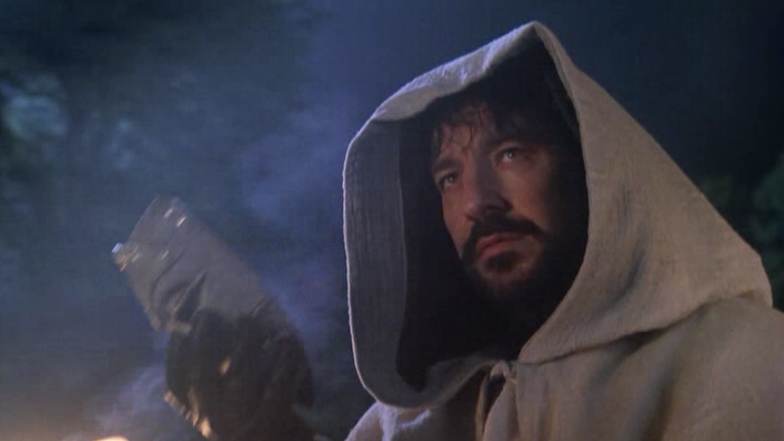By Jeff Powell – Daily Mail (Aug 1991)
Being cast as the villain, the bad guy, the man we all love to hate, is something that rather puzzles the amiable Alan Rickman.
He has made his reputation playing a long line of rogues, from the odious chaplain Obadiah Slope in the hit BBC series The Barchester Chronicles which first took him from obscurity in 1982 to his current role as the Sheriff of Nottingham in Robin Hood: Prince of Thieves.
In between he played that vile seducer the Vicomte de Valmont in the West End and Broadway versions of Les Liaisons Dangereuses. In the film Die Hard he was Hans Gruber the reptilian German mock terrorist determined to waste Bruce Willis. And all this from a man who didn’t turn to the stage until he was a 26-year old graphic artist in London.
Perhaps his long face, aquiline nose, narrow hazel eyes add up to looks which typecast him. ‘It’s probably because of the way my face is put together,’he agreed, ‘but each character I play has different dimensions. When people try to stick a label on my life I think: “it doesn’t seem like that to me”.’
Now he is to change his Mr. Nasty image. In two new productions he is playing characters who please. In short, nice guys. What a change!
He is a romantic ghost in a new film opening in two week’s time called Truly, Madly, Deeply.
And next week he returns to the stage in Tango At The End Of Winter in the part of a soulful Japanese actor in search of his roots. It opens in Edinburgh on Thursday and transfers to the Piccadilly in the West End later.
His most famous stage villain, the Vicomte de Valmont in Liaisons, was a scheming seducer whose cruel ambition was to dishonour as many women as his charms could ensnare..
‘People allow the Valmonts in this world. It was fascinating to watch that kind of evil being so entertaining and erotic.’
Rickman himself became uncomfortable with the role. ‘It was a cruel part to play for along time,’ he said, it would take a lot to get me to do that again. I wasn’t very pleasant to live with during that period.’
He has no such fears about his interpretation of the Sheriff on Nottingham. By even the most conservative estimate, at least half the audience reaches the climax of Prince of Thieves fervently hoping that it will be the Sheriff of Nottingham, not Kevin Costner’s Robin Hood, who wins Maid Marian.
The way Alan Rickman plays villains, nice guys are lucky to come second.
This 45-year-old London born son of an Irish factory worker and a Welsh mother has cornered the market in real baddies.
To say that his Sheriff steals the film from Costner is as much an understatement as reporting the loss of a few mailbags on the night of the Great Train Robbery. And the key to Rickman’s new role as a bankable actor turns on women’s fascination with the dangerous rogue to the chagrin of devoted husbands everywhere.
Many women find suave, sinister, handsome characters with a black sense of humour and a highturnover utterly irresistible and since timing is the touchstone of his profession , Rickman hasarrived among them at the ripest sociological moment.
His malevolent impact on the cinema has coincided beneficially with a shift in public attitudes, not to mention appetite. After Silence Of The Lambs old-fashioned heroes championing moral virtues are likely to be out for most of the Nineties. And while audiences cannot be expected to live by a diet of cannibalism alone, Rickman adds the merciful dimension of dry wit to the aura of terror.
Playing Costner’s medieval bad man as a manic cross between Richard III, Mick Jagger and Monty Python has spread his hypnotic charm to a wider screen audience.
Among the sharpest of his many talents he is reported to be a master of ad-libbing. After watching Costner, on his 25 million pound ride through Sherwood Forest, wander across tracks centuries apart and previously unconnected by history, it will come as no surprise to most to learn that the film was produced against the clock, with limited rehearsal time.
It is one thing making a box-office cop-out of the betrayal of the Red Indians – if The Academy awarded Wallies as well as Oscars then Dances With Wolves might have picked up as many brickbats for authenticity as commendations for cinematography – but something else entirely when Americans tamper with our legends.
Had they not done so, however, Rickman’s talent for thinking on his feet might still be awaiting discovery.
‘While I never said that I stole the movie from Robin Hood,’ he grinned, I did hijack the script.
The dialogue became more and more a daily conversation as it developed. I slipped in lines I thought would work.
‘I thought it important that the Sheriff amused the audience as much as anything else. People should come out of that movie having had a good time. The film lacked enough time. We were filming at the time of the year in England when you only have light until 3.30 pm, so it was very difficult to get everything done.
‘All of the characters were up for reinvention. With the Sheriff of Nottingham it’s probably okay to be manic and over the top. I also thought he should look like something between Richard III and a rock guitarist.’
A classic example of Rickman’s ability to be spontaneous comes shortly after the Sheriff flies into a comical rage and orders the cancellation of Christmas when it is explained to him that Master Hood robs from the rich to give to the poor. Rickman turns to a child he is planning to execute and confides by way of justification: ‘I had a very sad childhood.’
That shaft of improvisation survives in the two hours and twenty minutes of the finished version but other cameos from Rickman’s swaggering, spell-binding over-statement of villainy litter the cutting room floor.
Of suggestions that Robin appeared so insipid by comparison that he deliberately took the pruning shears to the Sheriff, Costner said: ‘I didn’t have a problem with it. It was big but it was bold.’
Rickman resolved his first inclination to reject a role which had been too much a part of his TV-watching childhood by camping up the Sheriff” ‘I tried to make him certifiable and funny. As black as possible in my raven wig but someone you can laugh at as well as hate.’
In the eyes of most women, he also made him wickedly desirable. Costner, I suspect, is grateful. Rickman describes the film as more like Raiders of The Lost Sherwood Forest in which he was called upon to do some hairy forest horseback riding and fight physically demanding sword duels with Robin.
‘It was certainly tough shooting my final fight with Robin Hood,’ he said. ‘ We didn’t have any rehearsal for it. We just ran through it sequence by sequence as we put it together , so it had real danger to it.’
He dismissed reports that he and Costner did not get on well and was happy to tell a story to illustrate that.
‘Late one evening, Mary Elizabeth Mastrantonio and I were standing on stage delivering lines to nobody. The next thing I knew somebody was lying on the ground reading lines that weren’t even his so that we would have someone to play off. I looked down and it was Kevin Costner.
He’d just finished a long day of filming and I thought: “Three cheers for you”.’
Sigmund Freud would have been better qualified than I to pronounce on the psychological implications for our society of the new vogue for liking villains but it is a trend about which Mr. Rickman is not complaining.
Naturally, given his acting pedigree, it is only Rickman’s stage and screen persona which is relevant to the phenomenon. Naturally. Although a late-starter, he gave up his own design business without a second thought so as to odd-job his way through the Royal Academy of Dramatic Art. The first fountain of inspiration was drawn while watching from the wings as Ralph Richardson gave master-class performances.
The Royal Shakespeare Company gave him opportunities in classic and contemporary acting. The Barchester Chronicles made him recognisable on television. Liaisons established his reputation on the London stage.
Outside the ring, of course, although he does describe London life with his economist girl-friend but without children as ‘like a trampoline’ which gives him a ‘certain freedom.’
They used to say beware acting with children or animals. Now it is the Prince of Villains who carries a health warning: Would you trust this man with your wife?



